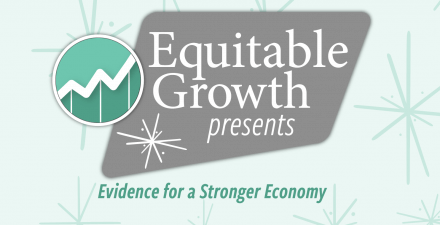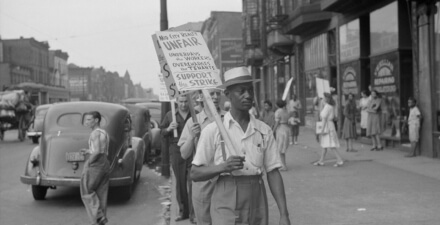Overview
Equitable Growth in Conversation is a recurring series where we talk with economists and other academics to help us better understand whether and how economic inequality affects economic growth and stability. In this installment, Kathryn Zickuhr, senior labor market policy analyst at the Washington Center for Equitable Growth, speaks with MIT Institute Professor Daron Acemoglu. He is the recipient of the John Bates Clark Medal in 2005, awarded annually to the best economist in the United States under the age of 40 by the American Economic Association, and the Erwin Plein Nemmers prize awarded every two years for work of lasting significance in economics. Acemoglu’s areas of research include political economy, economic development and growth, human capital theory, growth theory, innovation, search theory, and network economics and learning. His recent research examines the political, economic, and social causes of differences in economic development across societies, the factors affecting the institutional and political evolution of nations, and how technology impacts growth, the distribution of resources, and is itself determined by economic and social incentives. Zickuhr and Acemoglu discussed:
- His early research interest in technological change, political power, and economics
- His impetus for researching and writing Power and Progress: Our Thousand-Year Struggle Over Technology and Prosperity
- The differences between technological change before and after the Industrial Revolution
- The changing impact of technological change on shared prosperity amid the Industrial Revolution
- Political power and technological change in today’s societies and economies
- The “new tasks” interpretation of the second phase of the Industrial Revolution and post-WWII shared prosperity
- The decline of shared prosperity amid rising automation over the past five decades
- The role of unions in technological change and obstacles to that role in the United States
- How to boost worker power in the United States to create more shared prosperity amid technological change
- The dangers of technology hype and techno-optimism, especially around Artificial Intelligence
- The important role of the research community at the nexus of technological change, worker power, and socioeconomic inequality
Kathryn Zickuhr: Daron, it’s great to speak with you today. I’m really looking forward to our conversation.
Daron Acemoglu: I’m really looking forward to it as well. Thanks for making time to speak to me.
Early research interest in technological change, political power, and economics
Zickuhr: I want to start out asking about your background and research interests. You’re one of the leading researchers on the effects of new technologies on economic growth and inequality. What motivates your research interest in the relationship among technology, employment, and prosperity?
Acemoglu: I was drawn to economics when I was in high school in Turkey. My interest was very much related to the conditions of the country at the time, as it was under a military dictatorship and experiencing various economic problems. I was very curious about what made countries more democratic, less democratic, and what made some grow, some not grow.
Looking at the historical record to the extent that I was capable of understanding it as a teenager, I was drawn to this issue of economic growth and how it happened during a particular period, in a particular set of countries, and under a very specific set of economic and political systems. Those were the sorts of questions that were fascinating to me. I got into economics to study them, and of course, quickly discovered that that’s not what economics was mostly about.
But when I started doing my Ph.D. dissertation, the two sets of topics that were mostly in my mind were about economic growth and technological change on the one hand, and political economy, political power, democracy, and repression on the other. And I did see a number of connections, but I couldn’t fully understand and I couldn’t really bring them together. I think the more recent research that I’m engaged in is trying to bring these ideas together.
I am particularly interested in technological change because that’s one of the most fascinating things that humanity has ever engaged in—our attempt to control nature and our attempt to control technology itself. Technological change has sweeping implications, but it’s also embedded in political systems and social beliefs. It also depends on priorities of any given nation, any given group, and how these things are determined and how they interact. Those are some of the questions that act like a conceptual umbrella for me.
And within that domain, thinking about digital technologies and automation becomes a very different endeavor than just a technical discussion of, say, ‘we’re going to increase productivity by having large language models.’ And that’s what motivates me in this research.
The impetus for researching and writing Power and Progress: Our Thousand-year Struggle Over Technology and Prosperity
Zickuhr: You have a new book written with your colleague at MIT, economist Simon Johnson, coming out next month. The title is, Power and Progress: Our Thousand-Year Struggle Over Technology and Prosperity. And that interplay that you mentioned between technology, economics, political economy, and power is very central to that book.
Acemoglu: Absolutely.
Zickuhr: Why did you decide to take such a sweeping historical view of a thousand years?
Acemoglu: Well, actually, we wanted to go back 10,000 years, but we thought that would be too preposterous. But joking aside, at the end, we couldn’t resist the temptation of going back to the emergence of agriculture, at least briefly. One thousand years is really a minimal time period because I don’t believe we can understand our current moment and the struggle over how to make sense of emerging technologies such as artificial intelligence or improved capabilities for communication, information gathering, and surveillance without a longer historical perspective.
I don’t think we can make sense of this history without recognizing that technological change and its direction have always been contested. Throughout history, new technologies have often been presented as working for the common good by the people who control them, but in practice, they have at times created inequality, poverty, misery, and even repression. Interestingly, at other times, we have seen new technologies create shared prosperity and even empower the disadvantaged. So this diversity is really interesting and gives us hope. It also calls for a much deeper understanding than I think most of the people who are actually at the forefront of policy or technological development have taken on board.
The differences between technological change before and after the Industrial Revolution
Zickuhr: And were there, especially as you were looking back earlier than the 19th century, any developments that particularly surprised you, especially between inclusive prosperity and holding people back?
Acemoglu: Well, one thing that is very much part of the common narrative is that the world was a dark place, the “dark ages” in particular, when there was no economic progress, no technological ingenuity, no science, and no improvements in living standards until the Industrial Revolution, when the forces of science and technology were unleashed and from which we all benefited.
Let me first say, I completely agree that we have been huge beneficiaries of the breakthroughs that started with the Industrial Revolution. Today, we are so much more comfortable, so much more prosperous, so much healthier, and with much better social conditions than people 300 years ago. And yes, without the technological breakthroughs of the last 250 years that would not have been possible.
That being said, I think the common narrative about the dark ages is wrong in every aspect, or at least it misses very, very important nuances. And I think those are some of the surprising things.
First, there were many technological improvements before the Industrial Revolution. They were not truly dark ages. Productivity increased, there were many radical ways in which production relations were improved due to transformative technologies such as windmills, horseshoes, and new crop systems and new crops were introduced. But on the whole, despite these advances, workers and peasants did not benefit from them. So it’s not that technology was stagnant, it’s that living standards were stagnant.
But it’s also not the case nothing ever changed for workers and peasants. There were periods in which they benefitted and those were periods in which political power shifted away from landlords or religious and aristocratic orders toward regular people. So that already tells you that the relevant history is both more complex and more interesting. It’s certainly one in which there were possibilities for people to have done much better than they did.
Political power and technological change in today’s societies and economies
Zickuhr: Yes. And power is, as you write in the book, and as you’ve written elsewhere, very central to how we understand technology. Technology is about power. So I wanted to pull on one of the threads from the book, because one of the issues you’ve written about in your new book and elsewhere is workplace surveillance. Why is workplace surveillance, or as you noted recently surveillance in general, such a central issue for understanding how technology intersects with inequality and economic growth?
Acemoglu: Absolutely that surveillance is critical, both as a substantive issue but also as a symbol. As a symbol, I think it captures exactly what you said, that technology and power are inseparable. Surveillance is always something that’s enabled by technology. It requires data collection, information, observation, and organizational structuring. And many of the important technologies that have emerged over the past 1,000 years are about that sort of information gathering and information collection.
From Jeremy Bentham’s panopticon to modern digital tools, they enable a much better structure for people to observe how others are behaving. But that is also about power because if, as an employer, I know everything that you’re doing, then that gives me much greater power in our negotiations, in the way that I structure work, in the way that I make my tradeoffs about whether I should try to build goodwill with you or whether I can just pay you low wages and put you on a very strict regimen.
This power issue translates into other dimensions of work. And today, this is a vital question because the ability of employers to collect information, monitor workers, and structure work up to its minute details has advanced to a level that is completely unparalleled in history. We need to have a fundamental discussion about what are good jobs in this context. Amazon.com Inc. pays $15 an hour in its warehouses. That’s a good wage for low-education workers, and in many parts of the country that’s a wage that young, high school-graduate workers will not be able to get. But I don’t think we should think of Amazon as offering good jobs. And I don’t think that most of its employees consider these good jobs. These workers have to put up with a very high degree of surveillance, data collection, and lack of autonomy. These issues will become, and have to become, central to our thinking about what shared prosperity and good jobs mean in the 21st century.
The role of unions in technological change and obstacles to that role in the United States
Zickuhr: What’s an example of a time when unions played that role of facilitating the implementation of new technologies in ways in which the gains could be shared by workers and advance productivity and economic growth? And what were some of the conditions, including maybe policy conditions, that allowed that to happen?
Acemoglu: Well, unfortunately, the better examples come from outside of the United States, and there are reasons why that’s the case and why they need to be talked about. The two best examples are from the Nordic countries and from Germany, in different ways.
In the Nordic countries, you have sectoral wage bargaining and the unions are very cognizant about the role of technological change and importance of investment for worker productivity. These sectoral wage bargains have to be done in a way that encourages firms to invest in new technologies, especially because many of these firms depend on export markets where productivity is critical. Overall, the issue of firm productivity is a central part of their sectoral bargains.
In Germany, these issues also play out in somewhat similar ways in negotiations and even more so in work councils, which are separate from the wage negotiations. Work councils are more about the communication of working conditions, sometimes about coordination on technology. Work councils play a critical role for workers to have their voices heard on what new technologies are coming to make sure that their skills are utilized, and to get additional training to become better at the new tasks that are emerging. These sorts of issues are a central part of the focus for work council communications.
Now, in the United States, you can find episodes in which the same has happened. The United Auto Workers union has sometimes played that role in its bargaining with General Motors Corp., for example, so that automation is coupled with new machinery that is helpful to workers who earn new occupational titles. When new types of jobs are introduced, and at the same time workers are given commensurate training, they become up-skilled and it’s not just automated.
The International Longshore and Warehouse Union on the U.S. West Coast played that same role in the early stages of containerization, when containers were being introduced alongside new machinery for carrying the containers. Rather than blocking technological change, the union argued and successfully won restructuring work that then led to more employment and higher wages for longshoremen, while at the same time things were being automated.
But if you look at the details in both cases, there was opposition from within the unions. Some far-sighted leaders played an important role, and this wasn’t always repeated. There are a number of reasons for that. The first and the most important one is that in the United States, labor-management relations have been much more conflictual than in continental Europe or Canada. And once you get into this conflictual relationship, it’s harder to use unions’ power for this sort of restructuring work of redirecting technological change when management does everything in its power to destroy unions. So it’s a bad equilibrium.
The second is the institutional structure of unions in the United States. U.S. labor law says, or is at least interpreted to say, that the union bargaining unit resides within each business establishment. This creates a very narrow negotiating focus for the union just with the manager of a single establishment. And it leads to a more conflictual relationship, with less room for a more holistic approach around technology. It is more conflictual because, if a business establishment somehow manages to eliminate a union, then it’s going to create a cost advantage for it relative to other business units in the same firm and even more importantly, relative to other firms.
So this increases the incentives for management to try to sideline the union. And it makes the union leadership much more narrowly focused on just trying to get wages for members within this business unit. This is why I think it’s not clear what the future of the U.S. labor movement should be in an age where industrial workers are going to be a minority of all workers. But whatever it is, I think it’s very important that the United States should not be stuck in this sort of very narrow bargaining-unit framework.
The dangers of technology hype and techno-optimism, especially around AI
Zickuhr: So-so technologies and so-so automation also link to another common theme in your writing, which is the danger of the hype around technology, around techno-optimism. I’d like to ask you specifically about some of the dangers of techno-optimism for researchers. I’m wondering if this shows up in how economists and other social scientists approach writing about technology’s impact on work in any way?
Acemoglu: Well, let me give a two-part answer to that because it’s an important question. First of all, I think our conversation so far has already touched on the dangers of techno-optimism. Even if I am only partially right, there are important power-related distributional issues about new technologies, especially new digital technologies. There are key questions about how we should use them, which ones we should develop, and who’s going to benefit, and who’s going to lose. One way of completely ignoring these issues is techno-optimism.
Techno-optimism results in the view that all these technologies are amazing, are wonderful, and are inexorably going to create a much better future. So let’s just forge ahead and implement all of them without any delay. That sort of techno-optimism is a way of completely ignoring the problems with these technologies, and I think we ignore them at our peril.
But secondly, techno-optimism in our industrial age and in the age of digital innovations is contagious. It’s in fact contagious within the academic community. Many people both in computer science and social sciences then end up subscribing to techno-optimism, which then creates this a vicious cycle. The experts are techno-optimists and that then gets transmitted to the media, and to the republic and then everyone becomes enamored with technology.
Now don’t get me wrong, I believe that we can benefit hugely from technology, and there are some technologies from which we have greatly benefited in the past due to the big breakthroughs of the Industrial Revolution. But that doesn’t mean that we can be optimistic about what technology is going to do, unless we build the right institutions for redirecting technology in a more human-friendly and worker-friendly direction and for sharing the gains from technology.
Zickuhr: A lot of these conversations are also happening now around Artificial Intelligence in particular, and technologies similar to AI. So does AI represent a new problem? And what can we learn from the past history of new technologies being implemented as we approach the questions that AI raises about work, inequality, and what sort of society we want to have?
Acemoglu: Part of the reason why Simon Johnson and I have written our new book is because we don’t think AI raises completely new questions, and that those questions can be informed by our study of the past. In fact, I think AI really brings to the fore these issues about the control of technology to a much greater extent. And that’s partly because there are some new elements about AI. And those new elements are the greater capabilities it creates for information acquisition, the control and curation of information, and the processing of information.
And second, AI also creates opportunities for much more pervasive applications than many other technologies, such as the weaving machines that the Luddites were so excited about, which were limited to the new textile industry in Great Britain and nowhere else. But as AI advances, the technology can be applied across a very vast range of domains. This really makes the same set of questions you just asked even more pertinent because who controls information, who controls data, and who controls knowledge is going to be very important. AI is going to make all of these issues more pervasive throughout the economy and our lives.
Then there is another element to AI that is arguably in its very nature. AI resources and AI technologies are monopolized to an unparalleled degree. They’re in the hands of a few companies and a small group of engineers, scientists, and computer scientists. This group is empowered and enriched because they control AI developments and AI applications, and everybody else seems to be disempowered. Critically, AI intensifies issues about who has power and who controls technology. It makes the following question inevitable: who controls the future?
The role of the research community at the nexus of technological change, worker power, and socioeconomic inequality
Zickuhr: Absolutely. How can the research community play an important role not only in how we measure those kinds of impacts, but also in how we understand the past and the types of futures these new technologies could create? What are some of the questions around technology and work that you think economists and other social science researchers should be trying to answer right now?
Acemoglu: Well, first of all, in much of social science, not just economics, technology has been largely a black box. Economics emphasizes the benefits from technological change, but we hardly look under the hood of what makes technologies work. Why did they follow that path and not this path? So I believe that is the most important area that we should be paying much more attention to. And again, this is not just an economics problem. Political scientists and sociologists also often focus on technology as a fundamental determinant of social outcomes. So in many of their writings, I see that same black box of “technology” that plays a key role, and this affects how as academics we look at digital technologies and AI, pushing us toward a view in which technology is an autonomous force acting on society and what we are seeing is the essentially preordained path of this exogenous force.
I don’t believe this is the right conceptual framework. Actually, the entire theoretical edifice of our new book Power and Progress and my previous work is that technology is very malleable. There are many different things you can do with your knowledge, and there are many different ways in which technology can be applied. So why are we choosing to apply them this way? And are we doing it right? I think those are very important questions.
Second, we cannot get a holistic understanding of where we’re heading and how we are or are not making good use of our resources today without understanding critical periods in the past where there were similar choices. There is a huge economic history literature on the Industrial Revolution, which is superbly informative, but we need to do more. We need to understand how those choices were made and we need to delve more deeply into the institutional context and choices of the past as well.
Those are the two areas that you’ve already touched upon in terms of the research community’s responsibilities. But there’s another dimension as well, which is how we are training the next generation. We need to talk about what are the priorities we are giving to the next generation of innovators, engineers, and policymakers? I think we may be failing there as well. And I don’t think this is academics’ fault per se, because current academia is in the midst of three currents that make independent perspectives on research and technology hard.
First, research has become extremely resource intensive. If you don’t have a big lab, if you don’t have a big research group, and if you don’t have money to buy big data sets, then you’re doomed. Government support has declined. Instead, most researchers get corporate support. And corporate support if you’re going to work on technology, requires turning to corporate sources, such as Amazon, Facebook, Google, and Microsoft.
Second, many researchers who want to study computer science and AI also want to go to work at Google, Facebook, and Microsoft. So everything is aligned such that computer scientists, engineers, mathematicians, statisticians, and economists are all pushed toward a research agenda that aligns very strongly with the priorities of these Big Tech companies.
Finally, for the reasons I have tried to articulate above, techno-optimism has become pervasive in academia as well, so both computer scientists and social scientists have an optimistic outlook about the capabilities and the consequences of new technologies.
Zickuhr: So what would it take to change that alignment?
Acemoglu: We really need to change how science is funded. Of course, philanthropic support is great, and corporate support is fine. But I think there needs to be a broader menu of choices and the whole research community needs to step back and reevaluate what it means to be ethical as an academic in this age where everything is up for grab in terms of the future of work, the future of information, and the future of data. I believe that business as usual may not be as attractive or as acceptable as before. In the midst of the nuclear arms race between the Soviet Union and the United States, physicists could have said, ‘okay, this is business as usual, we should just go along with it.’ But no, at some point, they said, ‘no, we’re going to set up some ethical standards and many of us are not going to work on nuclear weapons.’
Zickuhr: A larger menu of choices, as you put it, is so central to your writing on technology and how we approach it. So I’d like to ask about your work as part of Economists for Inclusive Prosperity, which is also thinking about all sorts of new ideas for tackling inequality and driving inclusive prosperity. What are some of the changes that might be needed in how policymakers think about inequality and economic growth in the 21st century?
Acemoglu: There are so many things to talk about, but let me just talk about one thing. I am very opposed to the views that we’re going to create a better future with AI and all these technologies, and so people say: ‘what if we destroy jobs, we’ll set up universal basic income or other transfer programs to make sure that the gains are shared.’
I’m very, very opposed to this point of view, for three reasons.
The first one is that I believe it is just a pipe dream. It will never happen in our current institutional and political system, because things like that are promised, but the political economy of it doesn’t work. Second, even if it worked, people don’t just create a social hierarchy on the basis of money, they create a social hierarchy on the basis of status. And if you create a society in which a few people like Elon Musk, Mark Zuckerberg, and Sam Altman are the geniuses that control everything and then they redistribute some of their income so that the rest of society gets enough, that just sounds too much like the Roman Empire’s bread and circus to me. It’s like they are giving the crumbs, but the social hierarchy is very clear. In my opinion, this would be a very sad society.
And third, actual work is very important for the human psyche, human social interactions, and human self-worth. I don’t think we should be thinking of justice as something, oh, we all have enough to eat or we all have comfortable life. A better notion of justice is that we all contribute to society and we are seen and understood to be contributing to society. This would be very difficult without work. Sure, perhaps we can all become charity volunteers. But I’m not sure whether that is meaningful. More importantly, true work has to play a central role, in my opinion, if there is a future in which we are all seen to contribute to society.
That’s why an agenda of redirecting technological change in a direction that creates new tasks or new opportunities for workers it’s very important to me. The alternatives are dystopian.
Zickuhr: These are all huge questions and I really appreciate you taking the time to tackle them with me today. Thanks so much.
Acemoglu: Such a great set of questions, Kathryn. I see you’ve carefully read the book. I’m touched and really happy.
Zickuhr: It’s a really great book and I’m really looking forward to our event in May.
Acemoglu: Yeah, I’m very excited as well.
Related
Explore the Equitable Growth network of experts around the country and get answers to today's most pressing questions!






